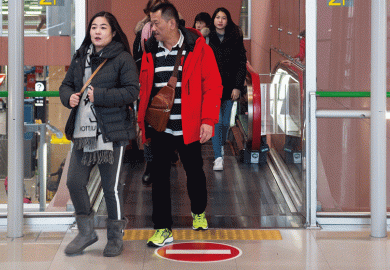The results of a huge government survey of students in Japan could be used to blame universities for the low use of English in higher education and “open up” the sector to private companies, a professor has warned.
Japan’s education ministry is polling 400,000 third-year students at 500 universities this month with questions on a range of topics, including English-language instruction and teaching in specialised fields.
An education ministry spokeswoman told Times Higher Education that the survey had three main aims: to produce results that could inform reforms at individual universities, to deepen society’s understanding of universities, and to provide data for national-level policymaking.
She added that Japan faced challenges in shifting to “learners-oriented education”, and in the development of “diverse and flexible education systems, so that diverse graduates can utilise their knowledge and skills acquired at university in society”.
Japanese higher education has been criticised in the past for a lack of openness including in its use of English, how it integrates foreign academics and its views towards liberal arts education.
But Masahiko Abe, associate professor in English at the University of Tokyo, warned that the poll “could be used as a step for the government to intervene in university education itself”.
“The result will show, as always, that students’ English is poor,” which he said was a consequence of a lack of English in daily Japanese life and low reading skills at the high-school level.
“But the government will certainly blame universities, refer to the convenient catch-word ‘globalisation’ and tell universities to open up part of the curriculum to private companies, so-called ‘English conversation schools’ in particular. This is my guess.”
In November, the government delayed changes to the English portion of its university entrance exam, after coming under fire for trying to privatise testing for reading, writing, listening and speaking. Critics said that the high costs, plus a limited number of venues outside big cities, would favour higher-income students.
The 2019 EF English Proficiency Index, released in November, ranked Japan 53rd in the world, down from 49th last year, placing the world’s third-largest economy between developing nations like Vietnam and Pakistan. More alarming is the drop from 2011, when Japan had fewer competitors internationally and was ranked 14th.
Shaun O’Dwyer, an associate professor at Kyushu University’s Faculty of Languages and Cultures, said the ramifications of Japan’s English problems went deeper than just rankings.
“The international scholarly community is deprived of valuable knowledge, and Japanese scholars themselves are deprived of the benefits of international scholarly exchange, when their work is not published in other languages,” he said.
According to Professor O’Dwyer, some academics in science fields publish in international journals and present at overseas conferences. However, the humanities and social sciences have traditionally been taught and written about in Japanese, and therefore fail to engage a global audience.
A few of the more prestigious institutions, like the University of Tokyo and Akita International University, have well-established English undergraduate programmes. Some private universities are developing English liberal arts programmes, while Professor O’Dwyer is involved in introducing an English science programme at Kyushu next year.
Still, for the recruitment of international teachers and students, “the biggest challenge for reform is linguistic”, Professor O’Dwyer said.
Register to continue
Why register?
- Registration is free and only takes a moment
- Once registered, you can read 3 articles a month
- Sign up for our newsletter
Subscribe
Or subscribe for unlimited access to:
- Unlimited access to news, views, insights & reviews
- Digital editions
- Digital access to THE’s university and college rankings analysis
Already registered or a current subscriber?







